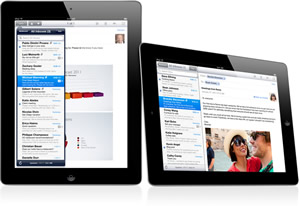Tablet searches grow in 2012
"2012 will be the year of the tablet", say many forecasts about the technology that will dominate the market this year. Something that is clear, at least, in regards to the growing number of tablets sold in all parts of the world. But perhaps what is not clear is what needs to be done to boost searches on tablets.

Tablet owners looking for things? If so, how do they search, what do they search, and is it different than how they search compared to desktop and / or mobile search? How can advertisers create content to effectively participate in this highly lucrative “tablet segment”?
Fortunately, there are a few things we know about tablet owners that can help us get a better idea of what they're looking for and how to find them:
They are "search engines": According to research by Google, search is the second main activity that tablet owners do, behind games.
Search behavior is different: both Google and Yahoo! They agree that the search behavior on tablets is different from the search behavior on mobile phones or the search behavior on desktop PCs, and that campaigns and ad groups should be separated according to platforms for best performance.
According to studies by Yahoo! and Bing, unlike mobile searches (on smartphones), tablets do not focus on carrying out a task (mission), but on finding new and interesting content, without really knowing what they are looking for.
Additionally, tablet users search at different times compared to mobile and PC users. According to Google, desktop search is during the day, and that of tablets and mobiles, at night. Therefore, Google concludes that desktops and laptops are used for work, and tablets are more useful for entertainment at home.
Tablet users are not very mobile: Many people consider a tablet a mobile device, but research shows that most people use them in a more "static" way. Most of them actually use them on the couch, watching TV, in the kitchen or in bed.
So if you group your tablet and smartphone ads into the same ad group, you may not be reaching the users you are interested in and showing your content to people who are interested.
Google recommends sharing desktop pc content for tablet users, as they are more like desktop users than mobile users in terms of behavior, but some advise building separate segments for everything.
Those of tablets do not look like those of pc: one of the reasons is that tablet search engines cannot access certain technologies that PC users can. The iPad, for example, is the market leader with a market share of 58%, and does not allow the use of parts in Adobe Flash. So, either the technology used is changed so that all users can see the content or one becomes invisible to such a high percentage of users.
What are tablet owners looking for? It is strange that the three major search engines tell us that the search behavior of tablet owners is different, but they only give "desktop keywords" in the keyword tools to help us develop relevant content.
So, you have to require the analysis. You can find tablet keywords in analysis, of course.
In Google Analytics, it is as simple as going to the report for mobile devices and filtering the information with the following regular expression to isolate tablets:
tablet | tab | pad | slate | thinkpad | viewpad | ipad | lifebook | nook | windpad | xoom | xtablet | flybook | g-slate | ideapad | kindle | modbook | multipad | olivepad | paddle | playbook | quadpad | slimbook | t- touch | tuftab
Select the secondary dimension "keyword" to see what tablet owners are searching for. The problem with this method, of course, is that you can only see keywords for which the website being managed is optimized and not other types of keywords.
Ideally, Google and other search engines provide other similar tools in order to optimize the user experience based on devices in a well-discriminated way.